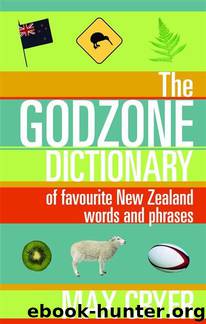The Godzone Dictionary of Favourite New Zealand Words and Phrases by Max Cryer

Author:Max Cryer
Language: eng
Format: epub
Tags: Language Arts & Disciplines/General
ISBN: The Godzone Dictionary
Publisher: Exisle Publishing
Published: 2009-01-01T00:00:00+00:00
L
Labour Day A public holiday on the last Monday in October. Although it is a day of leisure rather than labour, it was originally intended, when it began in 1899, to celebrate the acceptance of an eight-hour working day. The eight-hour day was not actually enshrined in law at that point, and only tradesmen and labourers were allowed the day off. Labour Day was observed on a Wednesday until 1910 when the day was changed.
ladies a plate A custom whereby women attending a social function would be asked to bring some food. The custom arose in New Zealand as a pragmatic demonstration that hospitality should be a shared responsibility. It was cheaper, too, than hiring a caterer and a normal practice in rural areas where there might not be any caterers. Sometimes providing a plate meant no entrance fee was required. The expression, which became widespread during the 1920s and remained in use throughout the 20th century, is famously confusing to overseas visitors or new immigrants.
lamb’s fry Common name for the liver of lambs, sold for cooking. Although the meat is often prepared by frying, the name fry has tended to become a genteel substitute for the more pragmatic word liver, which some find distasteful. Note this should not be confused with lamb fries, which is an American term describing cooked testicles.
(See mountain oysters )
lamingtons Cubes of sponge, chocolate-coated and rolled in grated coconut. The recipe originated in Australia and its exact provenance is unclear, but the name is not: the cakes were named after Lord Lamington, Governor of New South Wales in 1896. Only 36 and keen on sports, he was popular with the Australians, who enjoyed his relaxed style. During his tenure, someone invented this delicacy. Julia Robinson, author of Voices of Queensland, reports that Lord Lamington referred to the cakes as ‘bloody poofy’ but nevertheless, because of his popularity, the confection was named after him and the lamington was born.
lash, have a To make an enthusiastic attempt, to attempt an action energetically. Derived from the verb to lash, in its meaning of moving quickly with somewhat aggressive intent. I’d never done a bunjy jump, and the height of the bridge terrified me, but I thought I’d have a lash at it anyway.
laughing, to be away Indicates a propitious beginning – that all preparations have been made, attitudes are positive and the project or activity will be successful. We needed somewhere to rehearse and the community hall is available for eight Saturdays in a row, so we’re away laughing.
laughing gear A mouth. The term was made popular, and maybe also invented by, author Barry Crump in the 1960s. ‘Here,’ said Bill, holding out a tray of freshly made scones, ‘wrap your laughing gear around these.’
lava lava Samoan (in other Polynesian languages known as sulu, pareu ) A Pacific wrap made of cloth or finely woven matting, worn around the waist and loins. The length of the lava lava from the waist downwards is sometimes governed by the gender of the wearer and the occasion at which it is being worn.
Download
This site does not store any files on its server. We only index and link to content provided by other sites. Please contact the content providers to delete copyright contents if any and email us, we'll remove relevant links or contents immediately.
Housekeeping by Marilynne Robinson(3406)
The Poetry of Pablo Neruda by Pablo Neruda(3370)
Papillon (English) by Henri Charrière(3273)
World without end by Ken Follett(3009)
TCP IP by Todd Lammle(2643)
Fluent Forever: How to Learn Any Language Fast and Never Forget It by Gabriel Wyner(2448)
The Rape Of Nanking by Iris Chang(2326)
The Alchemist by Paulo Coelho(2305)
How Proust Can Change Your Life by Alain De Botton(2265)
The Partner by John Grisham(1984)
Two lives by Helen Naylor(1944)
Hitler by Ian Kershaw(1755)
Yerma by Federico García Lorca(1641)
Smilla's Sense of Snow by Peter Hoeg(1617)
Merriam-Webster's Pocket Dictionary by Merriam-Webster(1571)
Il cavaliere inesistente by Italo Calvino(1554)
Sophie's World by Jostein Gaarder(1548)
Deep Writing by Eric Maisel(1526)
Twilight of Idols and Anti-Christ by Friedrich Nietzsche(1496)
